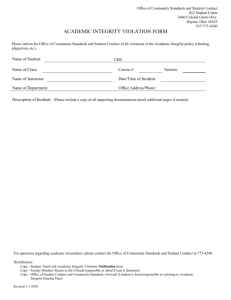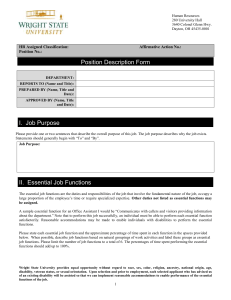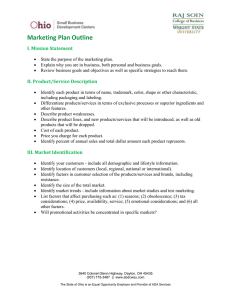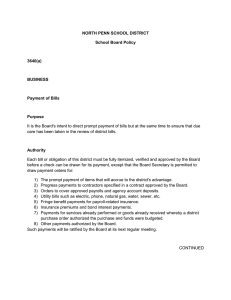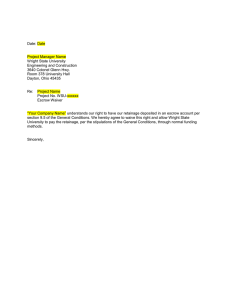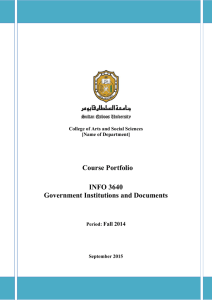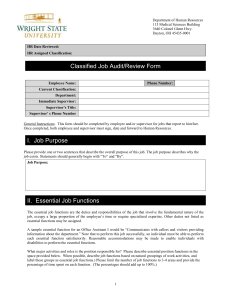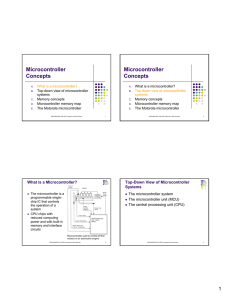Concept 3.1 Western Culture Clusters Europe’s culture clusters 1
advertisement
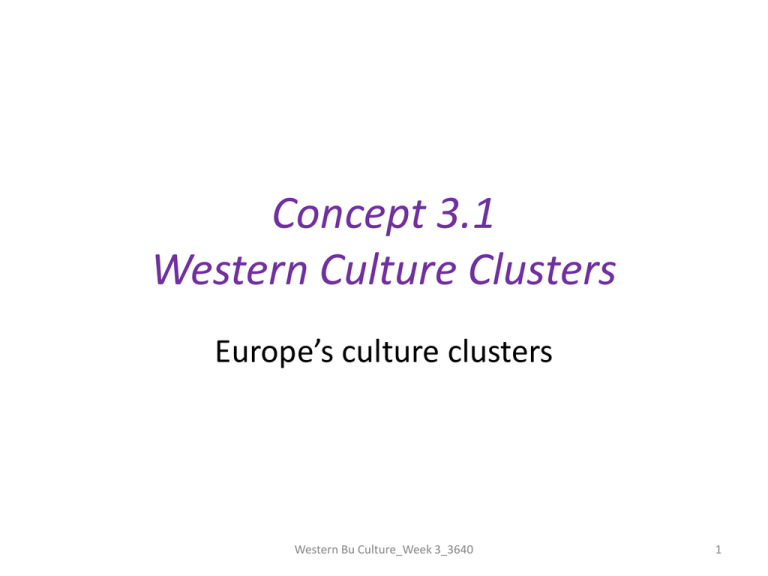
Concept 3.1 Western Culture Clusters Europe’s culture clusters Western Bu Culture_Week 3_3640 1 European Union • Origin: a common economic market to fair trade amongst European countries (West). • A body with common institutions at economic, social and political levels • Historically- 2nd WW. • To Bring peace & prosperity amongst continents at war • To establish & promote human rights, rule of law & democracy, eliminate all forms of discrimination • See Exhibit 3.1 p 41 on values among EU citizens Western Bu Culture_Week 3_3640 2 Latin Europe • Strong Catholic churches, Roman languages • Roman Empire influences • More personal approach to managing & organising but in a highly bureaucracy • Formalization of hierarchy and proceduresmore efficient. • Reliance on family & personal relationships & connections to get things done Western Bu Culture_Week 3_3640 3 • Italian management: Dual leadership, a couple • The leader assumes external roles as well keeping an eye on internal matters . Both complement each other • In France, 1 leader as top management, fulfilling contractual obligations & preserving status/position. Must be seen as big boss. • Cultural dimensions of Latin Europe: low in humane orientation practices (degree of concern, tolerance, support) • Self interest is high but lack of consideration for others • Collective family consideration-greater loyalty & cohesiveness to their family. Western Bu Culture_Week 3_3640 4 Nordic Europe •Vikings culture and ruling systems •Reinforced cultural contrasting between Northerners & those of the Roman Empire • No over-riding hierarchy, no elaborate systems of control. Large independent communities, own laws & governing bodies •Scandinavians: self-sufficiency, fairness, egalitarianism & democracy. •Business management: boss as team leader & facilitator. Free expressions of opinions on the part of employees & voices are considered in making decisions. • Leader still makes final decision • Distinct Nordic features: authority is not remote, can question their decisions, managers are not expected have all the answers but make effective use of expertise among workers Germanic Europe • Quite similar with Nordic Europe • Lower power distance • Germany, Austria-adopt longer-term perspective in strategic decisions • More concerned with getting jobs done than with work environment & family • Masculine dimensions: ind initiative, assertive behaviour, explicit communication, results oriented Western Bu Culture_Week 3_3640 5 The Anglos • Anglo-Sexon: Citizens of British Isles & immigrants of N America & Asustralasia • Anglo-Sexon groups-the Angles, Saxons & Jutes. Settled in Britannia that Romans established & abandoned later. Now, England, a part of UK of Great Britain & Northern Ireland consisting of Wales, Scotland & Northern Ireland • Culturally (Hofstede’s), British are of less power distance, lower uncertainty avoidance but more individualistic, ambitious/aggressive than their counterparts • Relaxed management approach contrasting Latin & Nordic • Bureaucratic but pragmatic: job separate from personal life • Emphasis on the extent individual concerned contributes to the task. Western Bu Culture_Week 3_3640 6 Selection and Recruitment Latin countries-applicants must fit in the group norms. Interpersonal skills, personality and communicative competence. Eg French uses one-to one interview & less references. Particularist approach-skills and knowing how to operate within a web of relationships and hierarchies British: Universalist approach-objective criteria such as intellect and technical skills. Germanic cultures-equal concern with technical and candidate long-term career perspectives, involving further mobility. British: short-term career perspectives, job hopping tendency Western Bu Culture_Week 3_3640 7 Anglos outside Europe Anglo-Americans • US culture shaped by values of White Anglo-Sexon Protestants • Protestant work ethics (Max Weber)-the psychological conditions leading to capitalist civilization-hard work • Current business drivers are influenced by the intent to achieve & improve personal & societal standards *The rights of the citizens, equality as well as individual work ethics on achievement (masculinity), assertiveness, competition. *Strict rules, procedures, yet share commitment among company employees allows considerable delegation and decentralisation. *Bottom line in the shortWestern Bu Culture_Week 3_3640 8 term as success indicator • British & Americans businesses differ in looking at the future. Americans more optimism. Read Article in Exhibit 3.2 Anglo-Canadians Origin: Indians and Inuit territory French colonization-Quebec British took control Canada became independent in 1867 with clear borders of French-Canadian & Anglo-Canadian French & English: official languages Western Bu Culture_Week 3_3640 9 Anglo-Canadians Anglo-Canadian society • Dealing with French Non-French speaking, of British, Canadians – Latin continental Europeans and attitudes to Asians (Chinese)-charcterised management. Memos , by the way they manage. schedules are not the More British in a sense less norms formalised, less driven by • Dealing with Americans: individual goals but concern/aware of society as a the need and awareness whole. to stand their own Canadian different cultural groups ground – socially intact and preserving their cultural identitiee Western Bu Culture_Week 3_3640 10 Anglo-Australians *Australia & NZ_ UK Colonization. Australian Aborigines & NZ Maoristheir lives changed by the European settlers *Retained Anglo-Sexon identity after independence. *Australia the 1st to welcome the increased ethnic diversity from immigration of other nonEuropean countries-South-East Asia *“ Accepts and respects the right of all Australians to express & share their individual cultural heritage…” • NZ: largely British ethnicity Anglo-Sexon in nature but more collaborative than in UK or US. Implications; slow decision making. Hierarchical but modest egalitarian approach when dealing witn colleagues. • More direct & critical than their British counterparts. Humour is away of life Western Bu Culture_Week 3_3640 11 Latin Americans • Devised by the French in the 19th C to differentiate Anglo-Saxon North America and Spanish/Portuguese South America • Shared cultural values despite differences bet Central & South American countries • Strong belief in the Catholic religion of South Americans-importance of family & the distinct gender roles. • Socially & economically, the gap bet the rich & poor is considerable. Lack of education amongst the poor inhibits progress Western Bu Culture_Week 3_3640 12 Latin Americans • Power with the patrons-daily life • Collectivist culture-pride, in politics, the church, business loyalty, interdepence in • Benevolent Authoritarian families but less value on approach-command & need institutional collectivism respect. (collective distribution of • With growing middle class, resources & collective industrialization, authoritarian is less prevalent. Mexico actions. undergoing significant social • Read article of Exhibit changes-the assertion, inclusion 3.4 in decision making causes cultural clashes • Warm, person oriented in dealing with others-strong Latin American way of doing business. Western Bu Culture_Week 3_3640 13
